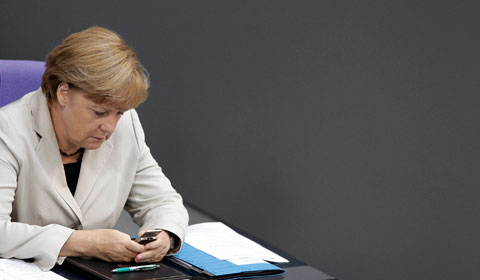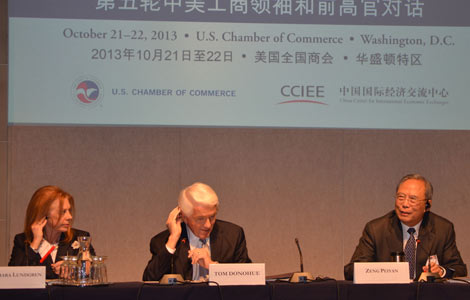Spy claims stir rebuke to Obama
Updated: 2013-10-25 00:31
(Agencies)
|
||||||||
|
 |
|
German Chancellor Angela Merkel looks at her mobile phone during a session of the Bundestag, the German lower house of parliament, at the Reichstag in Berlin. US President Barack Obama sought to assure Merkel on Wednesday that the United States is not monitoring her communications. [Photo / Agencies] |
President Barack Obama must be used to the drill by now — picking up the phone to get an earful from another foreign leader venting at rampant US spies.
On Monday, it was France. On Wednesday, Germany. No one knows which ally will be next with gripes about National Security Agency snooping on their e-mails and telephone calls.
The drip, drip, drip of revelations from fugitive contractor Edward Snowden is becoming more than just an irritant for the White House — it is undercutting its claims to have rescued George W. Bush-tarnished ties with America's friends abroad.
Obama, once greeted as a hero across the Atlantic, is turning out, for many Europeans, to be not so different than the man he replaced.
A rebuke from German Chancellor Angela Merkel — hardly prone to intemperate outbursts — took the NSA snooping affair to a new level of diplomatic angst on Wednesday.
Merkel called Obama and told him that if the NSA had indeed tapped her cellphone, she would regard it as "a grave breach of trust," and demanded answers.
Her pique could be read as a logical political move — given pressure she already faced over claims US spies monitored millions of foreign telephone calls and online exchanges as part of a sophisticated anti-terror sweep.
But it seemed to be something more.
Did the woman who grew up under the all-seeing eyes of East Germany's Stasi secret police take the claims, first reported by Der Spiegel, as a personal affront?
"I do think the relationship between her and Obama is going to be damaged," said Stephen Szabo of the German Marshall Fund of the United States.
"I think she is personally offended."
Obama has spent considerable energy courting Merkel and privately speaks in glowing terms of her intellect and political nous.
But the White House account of the call will do little to quell anger in Germany.
Obama spokesman Jay Carney said his boss told Merkel that Washington "is not monitoring and will not monitor" her communications.
That left the clear implication that her conversations may indeed have been swept up in the past.
Washington, while telling allies like France and Germany that their concerns are "legitimate," hardly seems contrite over the activities of the secretive NSA.
The Obama administration has promised foreign leaders to seek ways to balance security and privacy, but has come nowhere near an apology for activity it says is vital to breaking up international terror networks.
Privately, officials say that every nation spies — even on allies — and that Merkel is fair game in the great espionage caper.
They also point to US cooperation with foreign intelligence agencies — hinting that governments who publicly protest at US spying are in fact complicit in the game themselves.
Security officials separately dispute the factual basis of many reports based on Snowden's leaked material.
Even if the NSA is trawling through millions of calls and e-mails with sophisticated mathematical programs, it does not mean America is some kind of Big Brother that could, or would actually "listen in" on mostly banal conversations.
But the sophistication of that argument cuts little ice in nations where indigenous resentment at US power is fanned by sensational media claims.
"Since there are many such cases now in the news — Brazil, Mexico — I expect it will add to the general public anger aimed at the US among those already disposed to be angry," said Jackson Janes, president of the American Institute for Contemporary German Studies at Johns Hopkins University.
Some analysts warn that US tech firms operating in Europe could face a backlash, or that the continent will use the furor to push for increased data protection rules in a proposed US-Europe trade pact.
- Mexico demands US response over spying scandal
- US spy agency collects millions of email address lists
- US spy agency mapped people's behavior -NYT
- US Senate panel drafting bill to limit NSA spying
- Brazilian president blasts US for spying
- US spy agencies decry latest Snowden revelations
- More illegal NSA spying activities leaked
- UN vows to contact US over spying report

 US sets Dec 10-11 hearing on Asiana plane crash
US sets Dec 10-11 hearing on Asiana plane crash
 Health care site needs dozens of fixes
Health care site needs dozens of fixes
 Hainan to host 2014 global tourism summit
Hainan to host 2014 global tourism summit
 Delicated delights
Delicated delights
 Giant duck to exit after drawing the crowds
Giant duck to exit after drawing the crowds
 Miss Universe 2013 to be held in Moscow
Miss Universe 2013 to be held in Moscow
 Ministry to begin inspecting most heavily polluted regions
Ministry to begin inspecting most heavily polluted regions
 Spy claims stir rebuke to Obama
Spy claims stir rebuke to Obama
Most Viewed
Editor's Picks

|

|

|

|

|

|
Today's Top News
NQ Mobile hits back at short-seller after US stock plunge
Combating air pollution may hurt water supplies: Experts
US sets Dec 10-11 hearing on Asiana plane crash
Forum to guide China and Japan
Xi stresses ties with neighbors
China, EU to build trust and create fresh co-op
Health care site needs fixes
FM's EU trip will deepen mutual understanding
US Weekly

|

|






